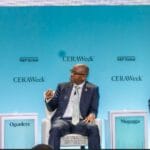With over 63 percent of its customers now metered, Eko Electricity Distribution Company launches an ambitious 5-year plan to eliminate estimated billing within its network by targeting 120,000 annual meter installations from 2024 to 2028.
Similarly, The Nigerian Electricity Regulatory Commission (NERC) has issued a stern warning to electricity customers against independently procuring transformers, cables, and other distribution infrastructure for the Distribution Companies (DisCos), emphasising that any such procurement must involve a formal agreement between the customers and utility company.
These were some of the Key highlights from the Day-1 of the Nigerian Electricity Regulatory Commission (NERC) 3-day town hall for customers of EKEDP in Lagos State which commenced on Thursday March 21, and billed to end on Saturday March 23, 2024.
Advisors gathered that the Eko Electricity Customer Complaints Meeting organised by NERC provides platforms for addressing electricity related complaints and urged them to attend the Customer Complaints Resolution with relevant documents to have their grievances heard and addressed.
Dr. Tinuade Sanda, the CEO of Eko Electricity Distribution Company (EKEDC), who was represented by Mr. Joseph Esenwa, the Chief Financial Officer, in her remark at the engagement session highlighted the increasing number of customer complaints at the Customers Engagement Forum and EKEDC’s commitment to resolving them comprehensively.
The EKEDC MD further emphasized that while immediate solutions may not be available for all complaints based on their peculiarities, she therefore assured that thorough investigations will be conducted to address them effectively and prompt actions.
Making further clarification concerning the 5-year metering plan, Dr. Sanda clarified that EKEDC will not solely provide all meters, as some will be sourced through Meter Asset Providers (MAP), Vendor’s funding, the Presidential Metering Initiatives, and other avenues.
The EKEDC’s boss further highlighted the challenges of electricity bill collection leading to a liquidity crisis that hinders significant progress in the Nigerian Electricity Supply Industry (NESI).
She revealed that the DisCos’ collection efficiency ranges from 76 to 82 percent, leaving a significant fraction of about 20 percent uncollected.
Dr. Sanda expressed concerns about the liquidity issues impacting the company’s ability to fulfill its service promises to customers, including capital expenditure, procurement of distribution transformers, injection substations, cables, and other essential infrastructures.
She noted that these liquidity challenges have also affected asset replacement commitments, hindering the timely provision of necessary distribution infrastructures crucial for improving services to customers.
Dr. Sanda emphasized the urgency of addressing these infrastructure needs to enhance customer satisfaction amidst the prevailing liquidity constraints within the industry.
The EKEDC MD/ CEO also emphasized the necessity of implementing aggressive debt recovery strategies to address the liquidity crisis within the Nigerian Electricity Supply Industry (NESI).
According to her, EKEDC is committed to intensifying cash collection efforts by deploying field supervisors to ensure prompt settlement of electricity bills and conducting extensive customer sensitization campaigns to clarify the importance of bill payments.
According to her, EKEDC has launched aggressive debt recovery initiatives as the primary strategy to address financial challenges.
Speaking about investment in infrastructure within the DisCo network, Dr. Sanda discussed EKEDC’s engagement with various governmental bodies to expedite the operationalization of the Lekki and Ajah substations.
She mentioned ongoing discussions with the Lagos State Government for the Lekki Substation and collaborations with the Ministry of Power, Transmission Company of Nigeria (TCN), and the Federal Government Power Company (FGNPC) to accelerate the energization of these facilities.
Dr. Sanda affirmed EKEDC’s commitment to investing additional funds into the substations if required, ensuring the timely realization of these crucial projects.
Mrs. Aisha Mahmoud, the Commissioner of Consumer Affairs at the Nigerian Electricity Regulatory Commission (NERC), in her remark stated that she is currently in Lekki, Lagos, with her team to address the concerns of EKEDC customers directly.
Hajia Mahmoud noted the three-day availability of her team to promptly resolve issues within the EKEDC’s network, and highlights the proactive approach of NERC towards engaging with customers in person rather than waiting for complaints at the head office in Abuja.
Furthermore, she noted that the customers engagement forum is dedicated to educating customers about NERC’s role in safeguarding their interests and implementing measures to prevent exploitation by the DisCos.
According to her, the Nigerian Electricity Act, signed last year by President Bola Tinubu, mandates NERC to protect electricity consumers.
Mrs. Mahmoud further emphasized the commission’s responsibility to ensure fair tariffs, regulate utility companies, and prevent consumer exploitation.
She said, “The Customer Engagement forum in Lagos aims to enlighten EKEDC customers on critical topics such as estimated billing, capping orders, and metering, addressing genuine concerns and enhancing consumer awareness within the electricity sector.”
“The Commission is committed to enforcing market rules and imposing sanctions on utility companies for any breaches of regulations.
“NERC is dedicated to upholding laws and ensuring appropriate penalties for non-compliance by utility companies.
Hajia Mahmoud therefore cited a recent example where NERC issued an order to DisCos for failing to comply with capping regulations, resulting in penalties for enabling estimated billings.
She said, “The order required DisCos to refund overcharged customers, with Kaduna DisCo already completing refunds and publicly listing affected customers in national newspapers.
Mrs. Mahmoud therefore urged EKEDC and other DisCos to follow suit in refunding affected customers and publishing their names in national publications.
She further underscored the importance of public awareness regarding NERC’s initiatives, and reassured the electricity customers that the Commission is actively enforcing laws, regulations, and market rules to ensure compliance by all industry players.
Bemoaning the persistent challenge of prepaid metering in the Nigerian Electricity Supply Industry (NESI) even after a decade of power sector privatization.
The NERC Commission expressed concern over the significant metering deficit of over 7 million customers in Nigeria, despite substantial investments in the sector.
She said, “The liquidity crisis faced by the DisCos, hinders the immediate metering of all customers, necessitating a phased approach over time.
“Furthermore, there is a need to ensure sustainable solutions to bridge the metering gap, example is the Presidential Metering Initiative led by the Power Minister and metering initiative by the Meter Asset Provider (MAP) which are key strategies,” she said.
The Commissioner further explained that while MAP offers vendor and DisCos financing options for prepaid meters, she stated that the high costs of N150,000 for three-phase meters and N80,000 for single-phase meters, pose challenges for many electricity customers, considering the economic hardships faced in the country.
Addressing the funding constraints within NESI, particularly concerning the National Mass Metering Scheme, the Commissioner underscored the ongoing financial struggles experienced by industry players.
She therefore underscored the critical need for adequate funding and financing mechanisms to support initiatives aimed at improving metering infrastructure and addressing the metering deficit in Nigeria.
Mahmoud said, “The Minister of Power, Chief Adebayo Adelabu, is actively engaged in efforts with the PMI, and with adequate funding, the Government could potentially eliminate the metering deficit within one to two years, depending on the availability of funds.
“Customers often overlook their rights and entitlements; paying for electricity should guarantee not just power but a superior service experience, and customers should assert their rights to quality service when paying their bills.
“It is crucial for customers to understand that investing in the distribution network, including transformer purchases, is not their responsibility as consumers.
“While the cost is factored into the electricity tariff, if customers choose to invest in infrastructure like distribution transformers, the law permits DisCos to incorporate the investment into the tariff, enabling them to earn returns over the asset’s economic lifespan.”
The NERC Commission also said, “If about N100 million, for instance, is invested in the purchase of the transformers by the DisCos, it is expected to be spread over fifteen years within the economic life of that asset, and recovery of the cost gradually deducted by customers’ billings.
“We expect the DisCos to use the IGR to fund whatever purchase or use credits to purchase the assets.
“But in the event that they cannot do that and given the liquidity crisis within NESI, and since the books of the DisCos are already in the red, NERC’s regulations stipulate that customers can fund the purchase of the DT, provided there is solid agreement for refund between them.
“In this case, what the regulation stipulates is that the customers have to sign an agreement with the DisCo stating that a certain amount of money has been used to purchase the transformer, and a refund will be made over a certain number of years based on the agreement with interest and dispute resolution clause,” the NERC Commissioner said.
Mahmoud said, ” Do not buy the transformers for the DisCo”, cautioning that it is not the responsibility of the customers to procure transformers for the DisCos, adding that in the event that such happens, the customers and the DisCos must sign an undertaking,
Mr. Odozimba Iheakanwa, the Power Committee Chairman of the Lekki Estates Residents and Stakeholders Association (LERSA), has called for a clear timeline to address issues raised by customers in the Lekki-Ajah-Epe axis.
He highlighted the frustration of customers over recurring problems despite numerous engagement forums with stakeholders.
Iheakanwa stressed the need for reliable electricity supply and better service delivery from utility companies like EKEDC, emphasizing that customers in the Lekki-Ajah area deserve respect and timely issue resolution.
Expressing disappointment with EKEDC’s management response, Iheakanwa specifically mentioned concerns from the 1004 Axis to the Epe Corridor, urging EKEDC to address these promptly.
Additionally, the LERSA Power Committee Chairman advocated for the transfer of the Lekki 132/33KV 120MVA GIS substation to EKEDC under Lagos state government’s supervision to enhance electricity supply in the region.
Iheakanwa urged EKEDC to be ready to energize the Lekki substation, emphasizing that this action will enhance power evacuation within the Lekki corridor.”
Key highlights from the inaugural day included discussions on operational performance data of grid-connected power plants, updates on regulatory orders related to capping of estimated bills, and insights into EKEDC performance improvement plans.



